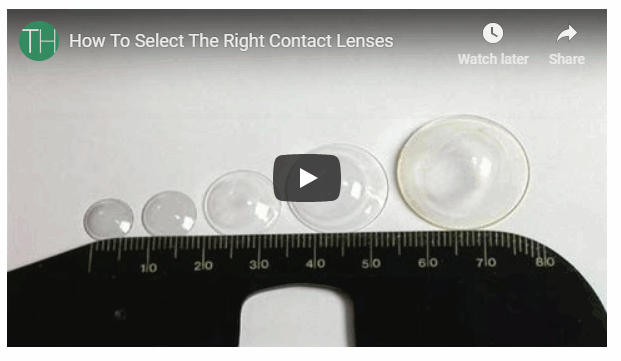Glasses and contacts can be expensive but when it comes to your eyesight you want to be sure to do it right. When it comes to contact lenses, you have a few options to choose from. You can get contact lenses that you throw away on a daily basis or weekly basis (called Soft disposable lenses), or you can get the kind that you can wear for longer periods before tossing (called extended wear lenses).
The Benefits of Daily Disposables
Daily disposable contacts are meant to be tossed daily. They are convenient especially when traveling because you don’t have to carry all the cleaning supplies. Many people choose to wear disposable contact lenses exclusively simply because they are very convenient. You can throw them away every day, and you don’t have to invest in cleaning solutions or trying to disinfect your contact lenses. Because of that, you don’t have to worry about tearing them or damaging them in any way when you are trying to clean them or accidentally dropping them down the drain. Because of their ease of use, they are ideal for teens and children, and you don’t have to worry about keeping track of when you began using your new pair or when your next cleaning is due. You will also avoid getting contact lenses that have build-up on them that can cause an infection. Your annual lens cost for daily disposable contacts is usually between $480 and $720. But if you order several boxes, such as a year’s supply, you will usually receive a significant discount.
The Downside of Using Daily Disposables
As with most things, there is also a downside to using daily disposable contact lenses. For one, they tend to cost significantly more than other options. But on the other hand, you don’t have to buy cleaning solutions, so that does offset the cost somewhat. Some brands will even offer rebates or discounts if you buy a year’s supply all at once which helps to lower the overall cost.
If you are environmentally-conscious, another downside is that daily disposables do use a significant amount of packaging compared to non-disposable brands. You may have a harder time finding a prescription that is right for you if you need to wear bifocals or have another issue. However, there are new prescriptions emerging all the time so even if you can’t get a compatible lens right now, it doesn’t mean that you won’t be able to wear disposables down the road.
The Benefits of Weekly Contact Lenses
Weekly contact lenses are more affordable and are durable so that they will not tear as easily as daily disposables. That’s because they are significantly thicker so that they will last for a week. They are great if you only wear your contact lenses for a few hours every day. If you don’t wear your contacts for long periods of time, you should go with the weekly disposables since you will get your money’s worth. You can also wear them overnight if you need to on occasion. Just don’t make a habit of it because it may cause you to have infections. Weekly contacts cost roughly $220 to $260 per year
The Downside to Wearing Weekly Contact Lenses
When you wear contact lenses that are intended for weekly use, you’ll need to keep track of when you have used them. You’ll also need to store them in a case with contact solution which you will need to continuously need to buy in order to care for your lenses properly. If you have a limited amount of time in the morning to get ready, you may need to allow more time to get ready. You also need to be diligent in your contact care routine in order to avoid getting eye infections or irritations.
You may find that as you near the end of the use of your contact lenses that they may begin to irritate your eyes more and can become uncomfortable. This is because over time they will begin to get build-up on them and will need to be cleaned or disposed of. If you are prone to allergies, this type of contact lenses may not be for you because allergens tend to adhere to the sticky surface of contact lenses and can irritate your eyes. The kind of contacts that you ultimately choose will depend on your personal preferences but also how your eyes will react to them.
Extended Wear Lenses
Extended wear lenses allow you to wear them continuously both day and night for up to about a month. These lenses have a higher “permeability” allowing oxygen to pass through which is why you don’t have to remove them at night to allow your eyes to “breathe”. A 12-month supply of extended wear contacts typically will cost $250 to $300.
Hard Contact Lenses
These are the original type of contacts from the 1950’s and 1960’s which have mostly been supplanted by more modern materials. But are still used in certain special cases.
Rigid gas-permeable Lenses
These look very similar to the old style hard lenses but are able to be slightly larger because they allow some oxygen to get to the eye. They last a long time but do need careful cleaning and disinfection. But overall they are the safest type of lenses available. Rigid gas permeable contacts are custom-made for each patient. Because they are not mass-produced like soft contacts, gas permeable lenses are more expensive than soft lenses.
Colored or Cosmetic Lenses
These may be used primarily to change eye color but can also perform vision correction as well. Because you are still putting them in your eyes, they still need to be cleaned and disinfected like other lenses. Expect to pay roughly 70 to 80 percent more for colored contact lenses than for non-tinted lenses.
Custom Lenses
Custom lenses can be created to treat unusual or special conditions and usually fall in the rigid gas-permeable category. Other custom lenses may be made to disguise disfigured eyes and may actually be “hand-painted” to match the other eye.
If you wear contacts everyday and clean and disinfect them after each use, contact lens care solutions can cost you as much as an additional $150 to $200 per year. Once you and your doctor have decided on the best type of contact lense for you and you’ve found a brand that you like you can often save considerable amounts of money by buying online rather than continuing to pay full retail from your Optometrist.
You might also like:





